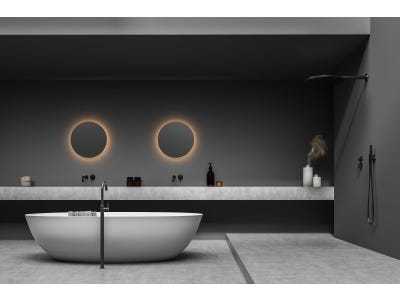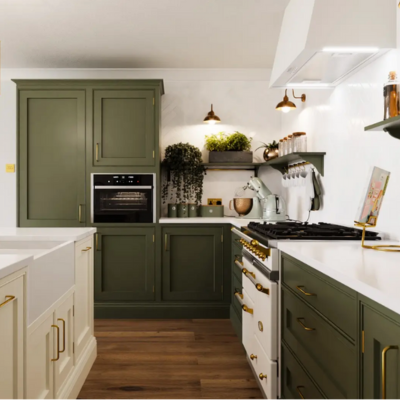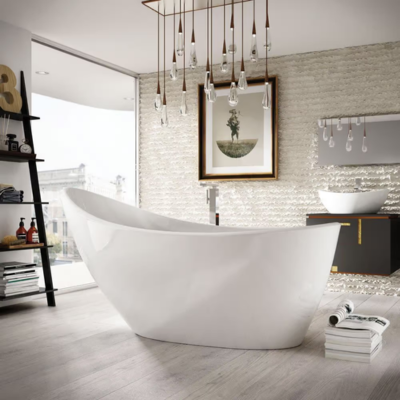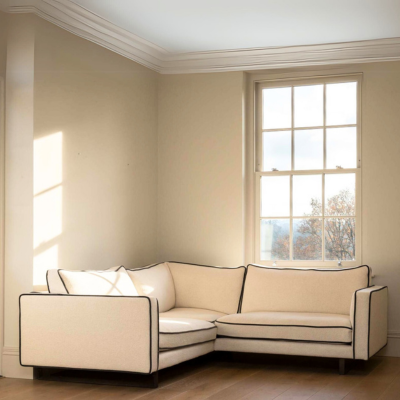Bathroom renovations are a substantial property investment. Upgrading your fixtures, appliances, tiling, and plumbing can increase the value of your home, all while giving you a more luxurious space to relax.
However, if you’re looking for an average price point for all renovations, you may be disappointed. The cost of any improvement project will vary massively depending on the scope of the job, what you’re looking to upgrade and how much you have to spend.
As the Kitchen, Bedroom, Bathroom outlet, we can give you a better idea of what to expect.
What factors influence the cost of a new bathroom?
Creating a budget for any type of home improvement can be difficult, especially if you don’t know what you’re dealing with.
Are you starting from scratch? Gutting an ineffective or out-of-date bathroom will require an extensive budget. But if you’re only looking to fit a shower or replace some fixtures, you’ll need much less.
Proper cost allocation will see your project through to the end. You can start on the smaller end and work your way up to a more dramatic transformation over time, which then allows you to re-evaluate your budget as you make gradual improvements.
Or, you can save up and spend lots of time on budget planning. You’ll need to front a lot more of the cost up-front, but the bonus is that you get to see the finished product sooner. Homeowners should pay close attention to the following factors and get more into details once you have a clear picture of what you want to do:
- Material: For purchases like tiling, shelf units and worktops, you’ll need to decide what to splurge on and what to save. Can you go without underfloor heating, or is it an essential part of your refurbishment? What about your counters? Do you want the durability of Corian, or would you rather pay less for a similar but not as long-lasting alternative?
- Features: Is your renovation based more on general improvements? Used or ex-display bathroom suites can help save you thousands of pounds. Or, if you’re replacing fixtures like toilets, shower trays or basins, as and when needed, this can help you save over time as you start your budget over from scratch.
- Labour: Then, there are the costs of labour and installation. Will you need a tiler for your floors and walls? You’ll need to hire someone to fit your fixtures and fittings, like baths and showers. You may also need plumbing, re-plastering or core drilling for the installation of new pipes.


1. Scope of work
Bathroom renovations can take many different forms. Some homeowners may want a full-scale overhaul, and others may want to make minimal but impactful changes, like swapping out tired basin taps or adding new mirrors or towel rails. As such, the cost of each project will differ wildly based on the scope of the work.
Cosmetic upgrades vs. a complete remodel
A cosmetic upgrade typically involves surface-level changes such as repainting walls, replacing fixtures like taps or shower heads, and updating lighting.
These projects can significantly refresh the bathroom’s appearance at a lower cost, typically ranging from £3,000 to £5,000 in the UK. A complete makeover, however, involves much more extensive work!
Remodelling projects can address functional issues, such as reconfiguring the layout, replacing plumbing and installing new fixtures and fittings. Of course, this can be significantly more expensive.
Costs typically start at £10,000 and could potentially exceed £25,000, depending on the materials and complexity.
Impact of structural changes
As we’ve mentioned, making any structural changes to your bathroom can also increase the price. These changes may include moving walls to alter the layout or installing larger windows for improved natural light.
Such modifications require more labour and materials and potentially planning permission or building regulations' approval, especially if they affect the structural integrity of the building. For example, moving a load-bearing wall can add thousands of pounds to the project due to the need for reinforcement and compliance with safety standards.


2. Bathroom size and layout
While this may be obvious, the costs and labour associated with revamping a compact en-suite will be much less than the main bathroom made for a family of four! However, that’s not to say that small bathrooms don’t also have their hidden costs and tricky corners.
In the same way, while bigger bathrooms have more to work with, they may cost less if you’re only looking to make minor improvements. What we’re saying is that there are many costs you won’t be able to determine until you examine the room in its original condition.
Small en-suite
A small en-suite typically incur lower costs due to the reduced amount of materials and labour required.
However, small spaces can present unique challenges, such as the need for custom fittings or compact fixtures that maximise limited space. Depending on the extent of the upgrades, renovating a small en-suite might cost between £4,000 and £7,000.
Large family bathroom
The larger the space, the more materials are needed for flooring, tiling, and fixtures, and the more complex the plumbing and electrical work can become.
Larger bathrooms also provide more opportunities for luxury upgrades, such as vanity units, new cabinets or separate bath and shower areas.
Carrying out more expensive upgrades like these may require a budget of £10,000 to £15,000 or more, particularly if high-end materials and custom designs are chosen.


3. Quality of materials
Plumbing fixtures and hardware arguably populate more of your bathroom space than larger purchases, like baths or showers. Particularly if your bathroom features a ‘vanity-style’ area with dual sinks or multiple cabinets.
Homeowners should also expect to pay more for higher-quality materials, like natural stone, marble and quartz tiles. If you’re creating a wet room, costs can be even greater.
Tile choice
Tiles are a significant aspect of bathroom design, and their choice can greatly impact costs. Ceramic tiles are a cost-effective option, as they’re durable and water-resistant for a relatively low price (other, more affordable options include porcelain).
For those seeking a more luxurious finish, natural stone tiles, such as marble, can provide a more upscale appearance but at a higher price, often exceeding £50 per square metre.
That’s why it’s important to remember your choice can add anywhere from a few hundred to several thousand pounds.
Fixtures
Fixtures, including toilets, sinks, and showers, also vary widely in price depending on their quality and design.
Basic fixtures might cost a few hundred pounds each, while high-end options, such as wall-mounted or designer models, can be several thousand pounds. For instance, a standard toilet might cost around £100-£200, but a designer model could easily exceed £1,000!
Fittings
Fittings, such as bath taps, sensor taps, and cabinet hardware, can range from budget to luxury. Budget fittings are often available for under £100, but high-end brands or custom-made options can run into the thousands. As higher-quality materials tend to last longer and require less maintenance, choosing durable fittings is essential for long-term value.
Breakdown of bathroom costs by budget
Budget bathrooms
As we’ve covered, a basic bathroom refresh typically focuses on cosmetic changes rather than structural modifications. For example, a budget renovation might include repainting walls, replacing outdated fixtures, and installing new, budget-friendly tiles or vinyl flooring.
Strategies for keeping costs low
- Retain existing plumbing: One of the most effective ways to cut costs is to avoid moving plumbing fixtures such as the toilet, sink, or shower. Reconfiguring plumbing can quickly escalate costs due to labour and materials.
- Focus on cosmetic changes: Prioritise updates that make a big visual impact without major construction, such as re-grouting tiles, painting, or replacing old fixtures.
- Shop smart: Look for deals on materials and fixtures. At Rehome, we offer ex-display bathroom suites, used bathroom vanity units, and used mixer taps to help you save even more.
Mid-range bathrooms
A mid-range renovation is all about improving your bathroom functionally and visually.
Within this budget, you could replace the entire bathroom suite, including a new bathtub, toilet, and basin. Upgrading to higher-quality materials, such as ceramic or porcelain tiles for the floor and walls, is also feasible.
You might also consider adding underfloor heating, updating the lighting scheme with modern fixtures, and installing a more efficient ventilation system.
High-end bathrooms
High-end bathroom renovations, which include using premium materials and making long-term investments in bespoke furniture, are on the more expensive side of the scale.
These projects often involve custom cabinetry, natural stone worktops, high-end sanitaryware, and designer fixtures. You might also consider integrating smart home technology, such as sensor taps with temperature controls or an LED bathroom mirror.
If structural changes are involved, high-end renovations can easily exceed £20,000.


Shop for used and ex-display bathroom suites with Rehome!
There’s no one way to do a bathroom revamp. You may make improvements here and there, spreading your budget across time. Or, you can dive in head first, working hand in hand with skilled tradespeople as they bring your vision to life.
At Rehome, we’ve helped improve bathrooms all across the country with our used, ex-display bathroom suites. For thousands less than their original cost, you can get an entirely new bathroom, complete with a basin, vanity unit, brass fixtures, and shower kit.
Take a leap of faith with Rehome, and get a head start on your bathroom renovation.








